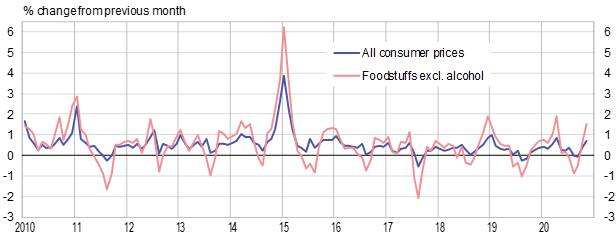BOFIT Weekly Review 51/2020
Russia imposes price controls in response to rising prices on certain food items
The month-on-month rise in consumer prices accelerated significantly in October and especially in November. The rise was considerably faster than in previous years, with November’s pace largest since 2015. In on-year terms, the increase in the CPI also gained pace in November and was 4.4 %. In particular, food prices rose quite sharply. A larger November jump in food prices last occurred in 2014 in the wake of sharp depreciation of the ruble that raised import prices. Food prices last month were nearly 6 % higher than 12 months earlier.
Some of the November price rise reflects the normal seasonal movement for fruits and vegetables, but this year their price increases were notably higher than in previous years. Official attention has focused on certain other staple items such as sugar, which jumped by nearly 30 % on average nationally in October-November and as much as 35−40 % in several regions. Sunflower oil prices increased by 15 % on average and as much as 25 % in some regions. Authorities also spotlighted prices of bread and other baked goods, along with flour prices, which have all gradually risen over the past two years. In some regions, those two-year increases have been as much as 25−30 %. While the increases in sugar and sunflower oil prices largely reflect poor domestic harvests of sugar beets and sunflower seed this year, world prices for these commodities have also increased somewhat.
President Vladimir Putin publicly announced price measures last week, whereupon the government acted swiftly in dealing with the high prices of these staples. Sugar and sunflower oil producers, along with large retail chains, have been directed to sign price control agreements with the government (represented by the industry and trade ministry and the agriculture ministry). Under the price control agreements, which run until April 1 next year, producers and sellers agree to markedly lower their prices of these items still this month and keep them stable in the following months. In return, the government promises to provide support. Sugar producers will be granted low-interest loans to purchase sugar beets. Flour producers will receive subsidies for purchasing wheat, and bakers will receive support in flour procurement. Such price control agreements between firms and the state have been used previously in Russia for other commodities deemed critical, particularly gasoline and fertilisers.
Authorities are also improving readiness for tighter price controls that will rather naturally require a regional emphasis. Under a law enacted in 2008, the government can impose price controls on socially significant staples in individual administrative regions if the price of the staple in the region rises by at least 30 % in a given month. The triggering increase will now drop to 10 % during a one- or two-month period (excluding seasonal fluctuations in prices).
Grain exports will be subject to quotas from February to mid-2021. Wheat exports within the quota will be subject to a roughly 10 % export duty. The grain exports that exceed their quotas, including wheat, will face a 50 % export duty. Increases of export duties on sunflower seed and rapeseed to high levels have already been approved and will remain in force from January to mid-2021. An export tariff on sunflower oil will also be applied in case there are violations of the price control agreements.
Food prices in Russia this year have risen faster than in most recent years

Sources: Rosstat and BOFIT.